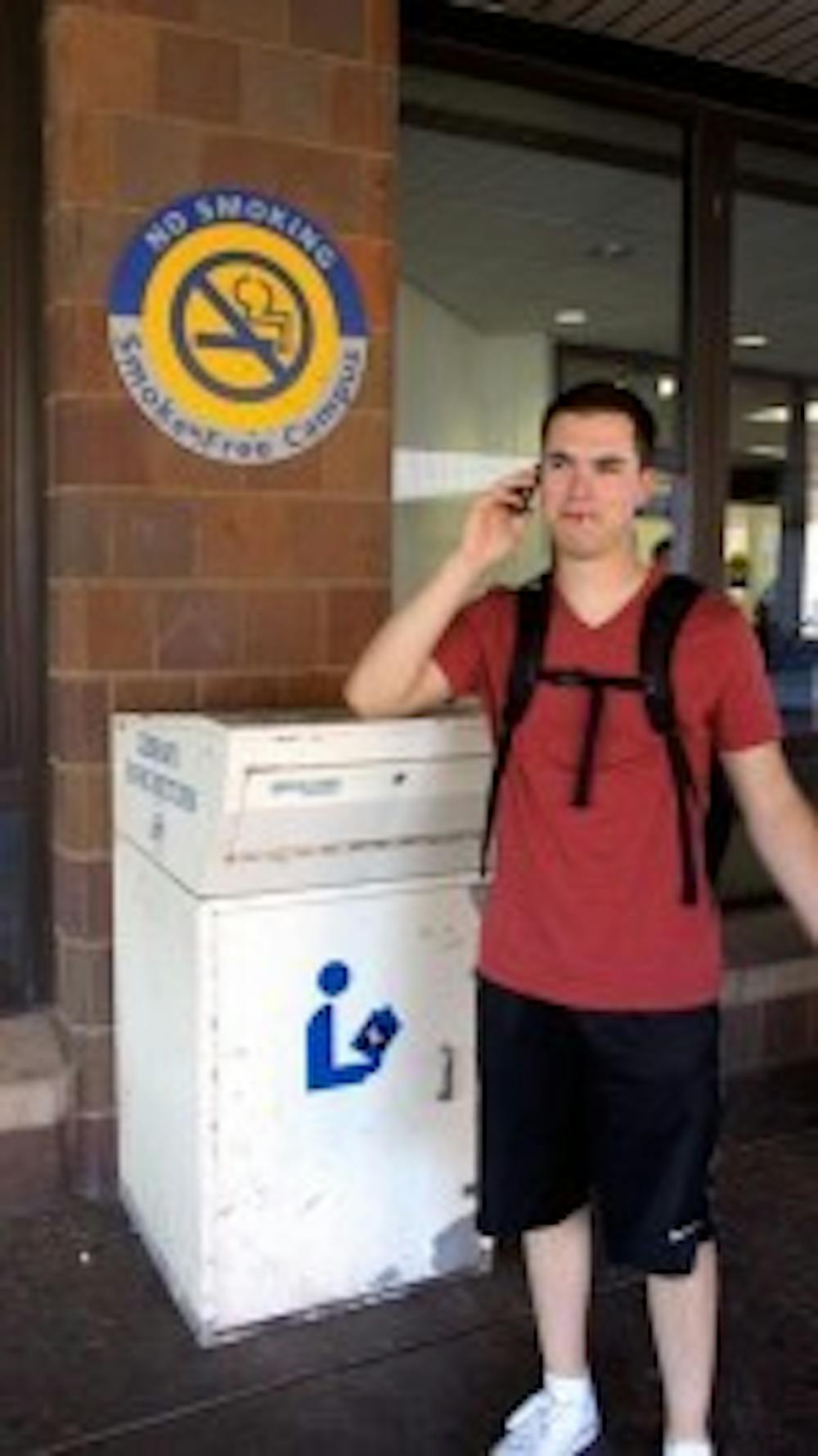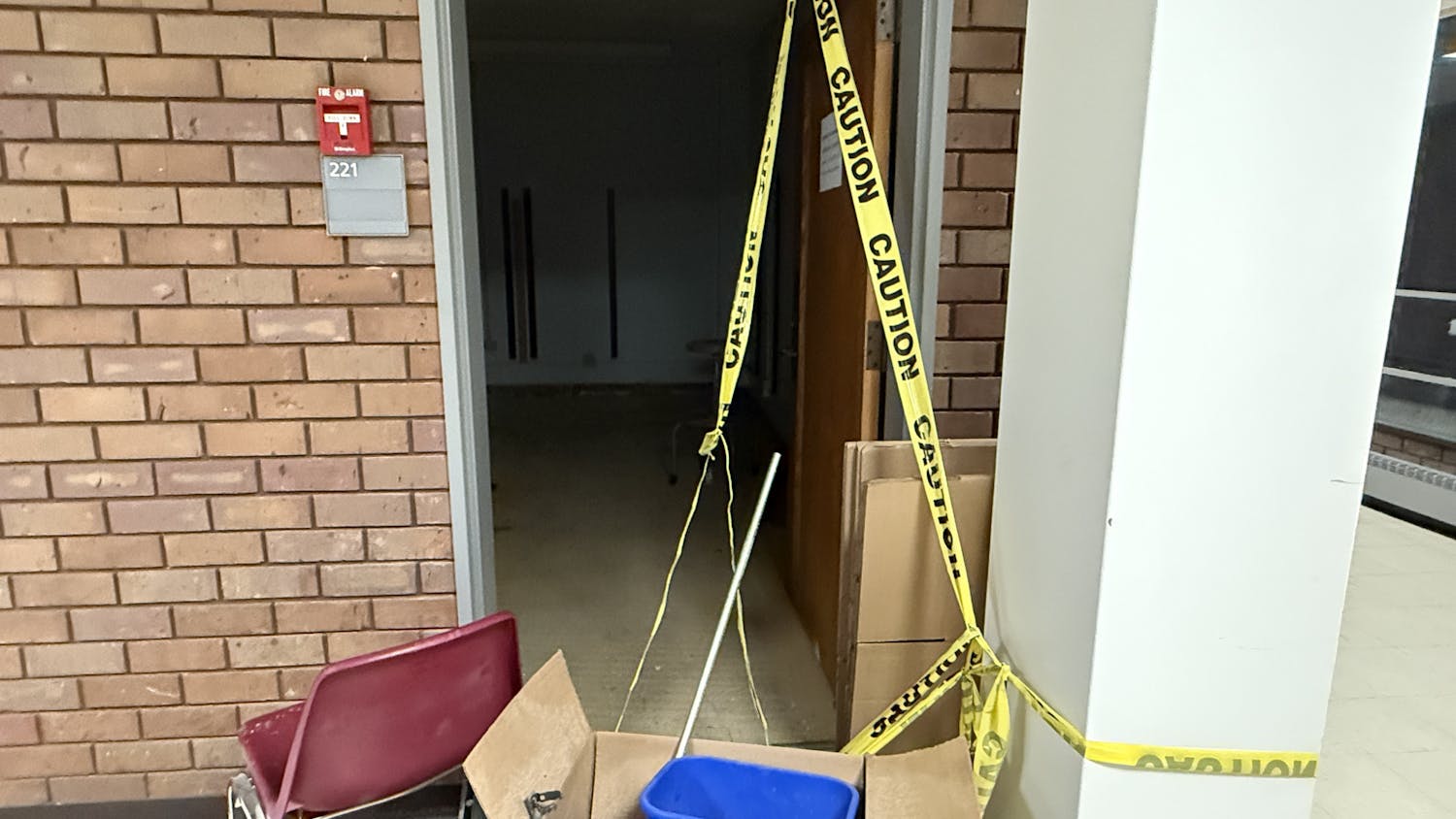Despite UB's UBreathe Free efforts, smokers gather outside Capen Hall, known to some as "Smoker Alley," as well as Lockwood Library and the Student Union.
Students, faculty or staff can call 645-SMOK to report someone smoking on campus. The voicemail states, "We will attempt to educate them."
But what if the person reported is a UB employee?
UBreathe Free doesn't affect faculty and staff because nothing in their union contracts says employees can't smoke on campus.
According to Jeffrey E. Reed, director of employee relations, the only way to discipline unionized employees - who represent the majority of UB employees - is to have the unions enter an agreement that says employees could not smoke. Last year, many of the union contracts were up for renegotiation, and, according to Sharlynn Daun-Barnett - an alcohol, tobacco and other drug prevention specialist in Wellness Education Services - a few of the unions at UB did support the UBreathe Free initiative.
"My office had asked the unions back then as to whether they'd be willing to enter into such an agreement," Reed said. "The vast majority of unionized employees here at UB expressed a lack of interest in entering into any such agreement that could result in discipline."
According to Gary Giovino, professor and chair of the department of Community Health and Health Behavior, the situation is more complicated than simply getting all the unions at UB to agree - because many of the unions are statewide.
Dennis Black, vice president for University Life and Services, said because the university can't hold faculty and staff accountable, it wouldn't be fair to hold students to a different standard.
William Blanda, a junior American studies student, thinks seeing faculty and staff smoking on campus sends a confusing and troubling message to the student body.
"When you see UB staff, especially in UB clothes, and they're smoking ... they need to set a better example," Blanda said.
Giovino agrees with Blanda, stating it sends the wrong message if the smoking policy isn't enforceable.
The UBreathe Free policy does not enforce penalties unless smokers display "unreasonable behavior" when asked to extinguish their cigarettes, according to Daun-Barnett. If the smoker displays unreasonable behavior, he or she may be referred to Judicial Affairs or University Police may be called. Students are not getting in trouble for smoking, rather, they're disciplined for unruly behavior.
UB employees aren't affected at all.
Some UB employees don't seem to consider the example they are setting.
"They shouldn't have it [UBreathe Free] at all," said a UB Stampede employee, speaking on the condition of anonymity. "It's just one cigarette. You really think my one cigarette [the driver was smoking at the time] is going to kill someone? Don't they [the university administration] have better things to do?"
While the university policy isn't applicable to employees and staff because of the union contracts, both Duan-Barnett and Giovino believe a state law would supersede the specifics of any union contract.
And such a law just might be on its way.
Last year, The City University of New York (CUNY) voted to ban smoking on all 23 of its campuses and Nancy L. Zimpher, chancellor of the State University of New York, would like to see a similar policy in place at all SUNY universities.
In a memo dated June 12, 2012, Zimpher urged the members of the Board of Trustees to adopt a resolution implementing a Tobacco-Free SUNY policy. The current policy, enacted Jan. 11, 2007, only applies to indoor areas and university vehicles. Zimpher also urged the board to support state legislation banning smoking on all university "grounds and facilities, and in vehicles owned, leased or controlled by the State University or its related entities."
Currently, such legislation is pending in the State Assembly.
Bill No. A10011 was introduced May 1, 2012, and calls for amending "the public health law, in relation to prohibiting smoking on campuses and facilities owned or operated by the state university of New York." The bill has been referred to the Committee on Health. Because the bill was introduced at the end of the legislative session, it should be acted upon when the Assembly reconvenes in Jan. 2013.
Giovino hopes a SUNY-wide policy and state legislation will speed up a culture change on campus.
"I hope the need for enforcement is minimal," Giovino said. "Many will comply simply because they are good citizens. But not being able to enforce the policy ... makes it difficult for people on campus with asthma, cancer and heart disease."
The only area on campus where a student could face consequences for smoking is in the dorms - where resident advisers must report any violations.
Legislation signed into law by then-Governor David Paterson in 2008 governs smoking in all dormitories at New York public and private colleges and universities. According to David A. Wright, judicial coordinator of Campus Living, students are subject to disciplinary action if they are caught smoking in the dorms.
"There's an incident report filed and the student has to meet with their hall director," Wright said. "Then we decide on sanctions. Sometimes it's community service; other times it's a research or reflection paper. We try and take an educational approach."
When students returned to campus this semester, those trying to purchase cigarettes at CVS or Tops Markets encountered a new university policy. As of Aug. 1, 2012, students were no longer able to purchase cigarettes or other tobacco products using Campus Cash.
Three university student groups spearheaded the UBreathe Free push: UB Against Cancer, the School of Pharmacy and the School of Social Work. According to a memo dated Aug. 28, 2012, from Jeff Brady, executive director UB Campus Dining & Shops, the student groups "lobbied vehemently for the change." It was implemented not only because of the students' request but also because it supports UB's no-smoking policy.
However, Student Association President Travis Nemmer questioned the effectiveness of UBreathe Free. He called the current policy unrealistic and believes it won't eliminate smoking on campus.
According to Nemmer, SA is looking into re-installing butt disposal containers around campus because cigarettes cause litter. He said the containers won't send a mixed message to students and the university would be "remiss not to provide safe locations for people to eliminate their cigarette butts when they do smoke."
The university's Wellness Center has programs to increase awareness of health dangers associated with smoking and to assist students wishing to quit smoking. The center also holds community service events to combat the environmental impact Nemmer is concerned with.
It's going to keep getting better and better," Duan-Barnett said. "But it may take 10 years." "We're not trying to alienate people; we're just trying to make people more thoughtful."
As of Oct. 5, 2012, at least 826 colleges and universities in the United States have adopted 100-percent smoke-free campus policies, according to Americans for Nonsmokers' Rights. This number has almost doubled since 2010.
Email: news@ubspectrum.com





